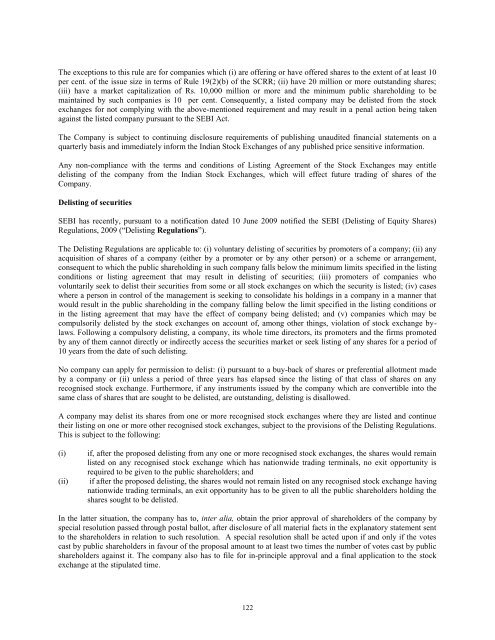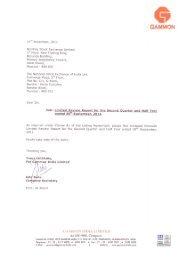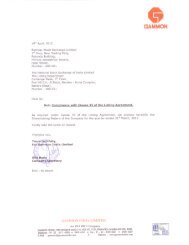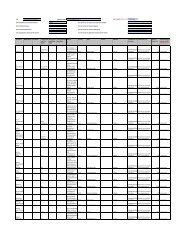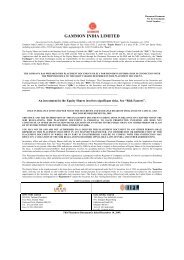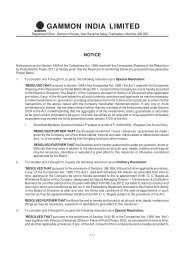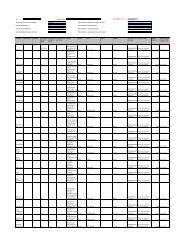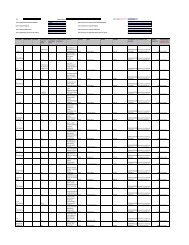GAMMON INDIA LIMITED
GAMMON INDIA LIMITED
GAMMON INDIA LIMITED
You also want an ePaper? Increase the reach of your titles
YUMPU automatically turns print PDFs into web optimized ePapers that Google loves.
The exceptions to this rule are for companies which (i) are offering or have offered shares to the extent of at least 10<br />
per cent. of the issue size in terms of Rule 19(2)(b) of the SCRR; (ii) have 20 million or more outstanding shares;<br />
(iii) have a market capitalization of Rs. 10,000 million or more and the minimum public shareholding to be<br />
maintained by such companies is 10 per cent. Consequently, a listed company may be delisted from the stock<br />
exchanges for not complying with the above-mentioned requirement and may result in a penal action being taken<br />
against the listed company pursuant to the SEBI Act.<br />
The Company is subject to continuing disclosure requirements of publishing unaudited financial statements on a<br />
quarterly basis and immediately inform the Indian Stock Exchanges of any published price sensitive information.<br />
Any non-compliance with the terms and conditions of Listing Agreement of the Stock Exchanges may entitle<br />
delisting of the company from the Indian Stock Exchanges, which will effect future trading of shares of the<br />
Company.<br />
Delisting of securities<br />
SEBI has recently, pursuant to a notification dated 10 June 2009 notified the SEBI (Delisting of Equity Shares)<br />
Regulations, 2009 (―Delisting Regulations‖).<br />
The Delisting Regulations are applicable to: (i) voluntary delisting of securities by promoters of a company; (ii) any<br />
acquisition of shares of a company (either by a promoter or by any other person) or a scheme or arrangement,<br />
consequent to which the public shareholding in such company falls below the minimum limits specified in the listing<br />
conditions or listing agreement that may result in delisting of securities; (iii) promoters of companies who<br />
voluntarily seek to delist their securities from some or all stock exchanges on which the security is listed; (iv) cases<br />
where a person in control of the management is seeking to consolidate his holdings in a company in a manner that<br />
would result in the public shareholding in the company falling below the limit specified in the listing conditions or<br />
in the listing agreement that may have the effect of company being delisted; and (v) companies which may be<br />
compulsorily delisted by the stock exchanges on account of, among other things, violation of stock exchange bylaws.<br />
Following a compulsory delisting, a company, its whole time directors, its promoters and the firms promoted<br />
by any of them cannot directly or indirectly access the securities market or seek listing of any shares for a period of<br />
10 years from the date of such delisting.<br />
No company can apply for permission to delist: (i) pursuant to a buy-back of shares or preferential allotment made<br />
by a company or (ii) unless a period of three years has elapsed since the listing of that class of shares on any<br />
recognised stock exchange. Furthermore, if any instruments issued by the company which are convertible into the<br />
same class of shares that are sought to be delisted, are outstanding, delisting is disallowed.<br />
A company may delist its shares from one or more recognised stock exchanges where they are listed and continue<br />
their listing on one or more other recognised stock exchanges, subject to the provisions of the Delisting Regulations.<br />
This is subject to the following:<br />
(i) if, after the proposed delisting from any one or more recognised stock exchanges, the shares would remain<br />
listed on any recognised stock exchange which has nationwide trading terminals, no exit opportunity is<br />
required to be given to the public shareholders; and<br />
(ii) if after the proposed delisting, the shares would not remain listed on any recognised stock exchange having<br />
nationwide trading terminals, an exit opportunity has to be given to all the public shareholders holding the<br />
shares sought to be delisted.<br />
In the latter situation, the company has to, inter alia, obtain the prior approval of shareholders of the company by<br />
special resolution passed through postal ballot, after disclosure of all material facts in the explanatory statement sent<br />
to the shareholders in relation to such resolution. A special resolution shall be acted upon if and only if the votes<br />
cast by public shareholders in favour of the proposal amount to at least two times the number of votes cast by public<br />
shareholders against it. The company also has to file for in-principle approval and a final application to the stock<br />
exchange at the stipulated time.<br />
122


